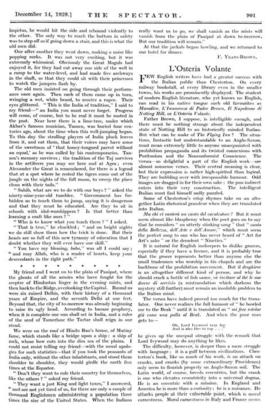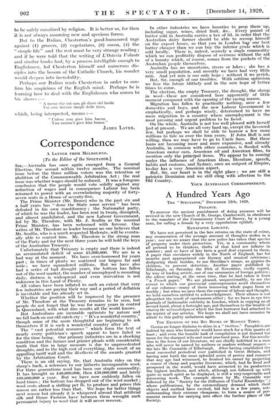L'Osteria Volante
FEW English writers have had a greater success with the Italian public than Chesterton. On every railway bookstall, at every library even in the smaller towns, his works are prominently displayed. The student of modern English literature, who yet knows no English, can read in his native tongue such old favourites as Manalive, L'Innocenza di Padre Brown, II Napokone di Notting Hill, or L'Osteria Volante.
Father Brown, I suppose, is intelligible enough, and there must be nothing strange about the independent state of Notting Hill to an historically minded Italian. But what can he make of The Flying Inn ? The situa- tions, fantastic but understandable to an Anglo-Saxon, must mean extremely little to anyone unacquainted with prohibition propaganda and its twisted connexions with Puritanism and the Nonconformist Conscience. The verses—so delightful a part of the English work—are almost nonsense verses. Their central meaning is clear, but their expression is rather high-spirited than logical. They are bubbling over with irresponsible humour. Odd images are dragged in for their own sake ; the pun indirect enters into their very construction. The intelligent Italian must find himself sadly puzzled.
Some of Chesterton's crisp rhymes take on an alto- gether Latin rhetorical grandeur when they are translated into Italian.
Ma chi ci canter?t un canto del cavalcatore ? But it must seem almost like blasphemy when the poet goes on to say that he considers " an utterly stinking song " that " canto della Bellezza, delr Arte e dell' Amore," which must seem the perfect song to one who has never heard of " Art for Art's sake " or the decadent " Nineties."
It is natural for English innkeepers to dislike grocers, especially if they have a licence, and it is probably true that the grocer represents better than anyone else the small tradesmen who worship in tin chapels and are the backbone of the prohibition movement. But it droghiere is an altogether different kind of person, and why he should crack a bottle of fish sauce, or invitare at thi le sue donne di servizio (a mistranslation which darkens the mystery still further) must remain an insoluble problem to the Italian mind.
The verses have indeed proved too much for the trans- lator. One never realizes the full humour of " he bowled me to the Beak " until it is translated as " mi fete rotolar gill come una palla at Beak. And when the poor man gets to—
Oh, Lord Ivywood may lop And is also free to top . . ."
he gives up the unequal struggle with the remark that Lord Ivywood may do anything he likes.
The difficulty, however, is deeper than a mere struggle with language ; it is a gulf between civilizations. Ches- terton's book, like so much of his work, is an attack on cranks, and cranks (by some extraordinary Providence) only seem to flourish properly on Anglo-Saxon soil. The Latin world, of course, breeds eccentrics, but the crank is one who elevates eccentricity into a universal dogma. He is an eccentric with a mission. In England and America he is more than a curiosity; he is a nuisance. He attacks people at their vulnerable point, which is moral earnestness. Moral earnestness in Italy and France seems to be safely canalized by religion. It is better so, for then it is not always assuming new and specious forms.
But to the Italian, Chesterton's good-humoured rage against (1) grocers, (2) vegetarians, (3) cocoa, (4) the " simple life" and the rest must be very strange reading ; and if he were told that the writing of L'Osteria Volante and similar books had, by a process intelligible enough to Englishmen, led Chesterton himself and numerous dis- ciples into the bosom of the Catholic Church, his wonder would deepen into incredulity.
Perhaps our Italian reads Chesterton in order to con- firm his suspicions of the English mind. Perhaps he is learning how to deal with the Englishman who comes to his shores :- " A meno cho voi non gli diato del lardo
Voi non dovete dargli dello fave,
which, being interpreted, means :— " Unless you give him bacon You mustn't give him beans."
JAMES LAVER.













































 Previous page
Previous page